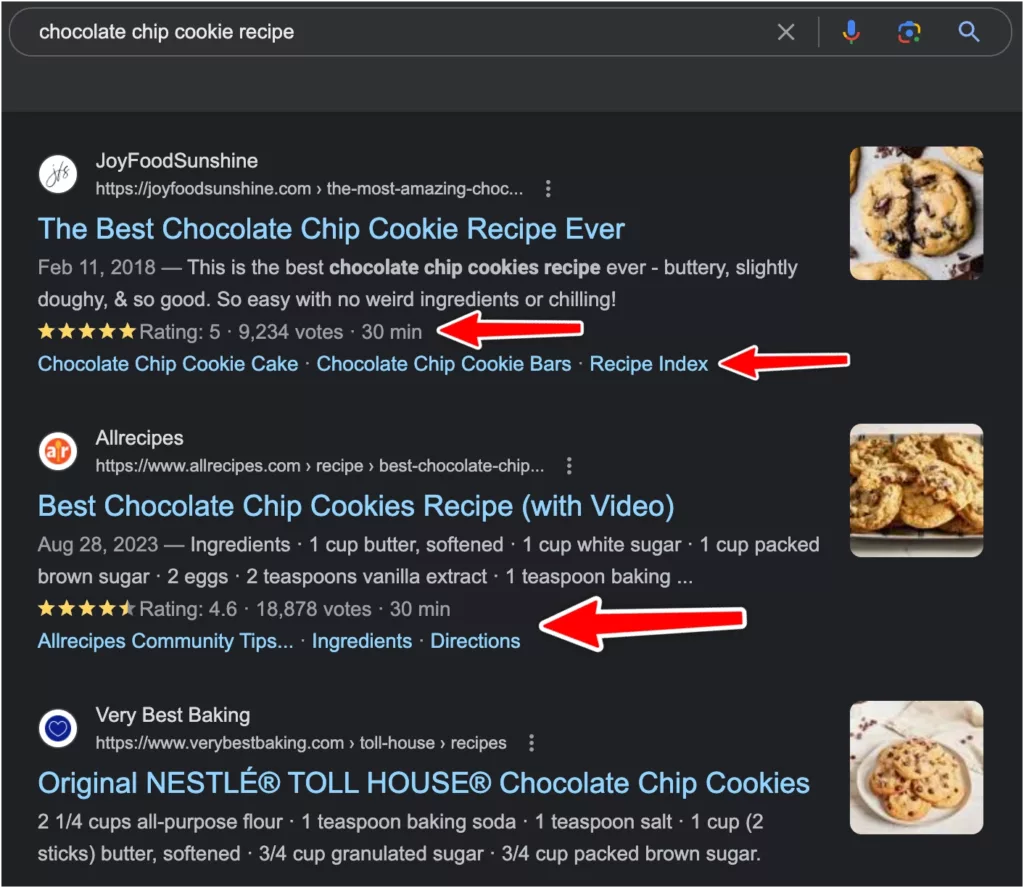Your cart is currently empty!
Rich results are an important part of SERPs and SEO. This quick guide explains what they are and how to get them in your listings, helping boost your results.
What are Rich Results?
Rich results are enhanced search results displayed on search engine result pages (SERPs). Unlike traditional results that only provide the page’s title, URL, and meta description, rich results offer additional, valuable information for searchers to navigate them visually.
They can include structured data like images, ratings, reviews, and interactive elements like calculators or maps. Rich results are critical for strong SEO, as they help listings stand out in search results and provide a more engaging search experience.
Is there a difference between rich results and rich snippets?
No! According to Google, “rich results”, “rich snippets”, and “rich cards” are all the same thing, but “rich result” is the current term.
Rich Results Example
Here are some rich snippets for “chocolate chip cookie recipe” in Google:

The reviews and additional information are the rich results. By contrast, the third listing doesn’t feature rich results and includes less information, making it stand out less.
The Importance of Rich Results
Rich Results have the potential to vastly improve your website’s visibility and user engagement on search engine listings. Here’s why they’re important:
- Enhanced Visibility: Rich Results help your website stand out from the crowd. By offering more than just the title and description, they catch the user’s attention and prompt more clicks to your website.
- Increased Traffic: Since they are more eye-catching and informative, they often lead to higher click-through rates, translating into increased website traffic.
- Improved User Experience: Rich Results provide users with valuable information upfront. This could be a summary of a blog, the cooking time for a recipe, or the average review rating for a product. It lets users decide whether to click on your site, enhancing the overall user experience.
- Potential for Higher Conversions: With increased traffic and improved user experience, the potential for higher conversions and sales on your site increases. Users are likelier to trust and engage with sites that provide detailed, transparent information.
Types of Rich Results
Many kinds can appear in search listings, including:
- Featured Snippets: Summary that appears at the top of search results
- Knowledge Panels: Box on the right side of search results with information about a topic
- Rich Cards: A visually rich format for displaying information, such as recipes or products.
- Reviews: Star ratings and review snippets that appear in search results
- Event Listings: Information about upcoming events, including dates, times, and locations
- Video Thumbnails: A preview of a video that appears in search results
How to Generate Rich Results
Now that we understand the importance, let’s walk through the process of creating them:
1. Choose Your Structured Data
Structured data is the foundation of rich results. It’s a standardized format that allows search engines to understand the content of a page and collect information for rich results.
Use JSON-LD. It’s the format recommended by Google and has signfificant benefits compared to alternatives. However, your capabilities will depend on your website, CMS, and other factors, so research your options if this method won’t work.
2. Select The Appropriate Schema
Schema.org offers shared vocabularies that webmasters can use to mark up their pages. There are many types of schemas. Here are some of the most common:
Knowing what schema types are available will aid your content strategy and help earn you rich results.
3. Implement Structured Data
Once you’ve selected the right schema, it’s time to implement it on your website. This process involves adding structured data to your webpage’s code.
It’s worth noting that the process might require some technical knowledge, particularly of HTML and JSON-LD. If you’re uncomfortable doing this yourself, you might want to enlist the help of a developer.
4. Test Your Implementation
Once you’ve implemented structured data, use Google’s Rich Results Test to verify your setup. The tool will identify any errors in your structured data, allowing you to correct them and ensure your pages are eligible for rich results.
5. Monitor Your Results
After implementing and verifying your structured data, monitor your website’s performance in search results. Google Search Console is an excellent tool for tracking the performance of your rich results. It provides insights into how often your site appears in search results, its average position, click-through rates, and more.
Advanced Tips
While the above steps give you a good foundation, there are more advanced strategies you can implement to leverage rich results further:
- Use More Specific Schemas: While using a general schema can help you get started, using more specific schemas whenever possible can increase your chances of getting rich results. For example, don’t just use the general ‘Product’ schema if you have a product page. If it’s a book, use the ‘Book‘ schema, etc.
- Leverage Structured Data Generators: If you’re uncomfortable writing structured data yourself, several structured data generators are available online. We like this Schema Markup Generator and the Structured Data Markup Helper from Google. These tools guide you through creating structured data, making it easier for beginners and developers alike.
- Monitor Search Console Regularly: Search Console is a valuable tool to check if your rich result efforts are paying off. Regular monitoring allows you to understand how your rich results are performing and make any necessary adjustments.
- Stay Updated: Search engines regularly update their guidelines and algorithms. Staying updated on these changes will help you stay ahead of the curve and make necessary adjustments to your structured data and overall SEO strategy.
Bottom Line
Rich results are invaluable for improving your website’s visibility and user experience. While implementing them might require a bit of technical prowess, the benefits they provide in terms of improved traffic and potential conversions make them a worthy investment.
Providing genuine user value is key to successful SEO and rich results. If you keep this in mind, you should see success in your efforts. ?
Topics






